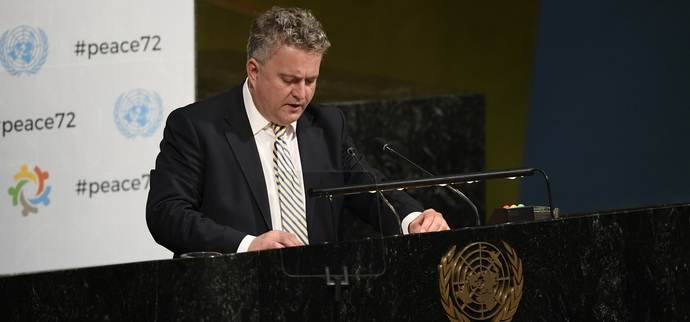The companies that violated the sanctions are subsidiaries of the large transportation group AnRussTrans controlled by former Deputy Minister of Russia’s Railway Transport Alexandr Annenkov and his family members.

The TIS-Crimea company, which transported the Russian military “little green men” to Crimea, was put on the Russian registry in 2015. It was founded by the Kyiv-based company TechInvestService, which in turn belongs to Annenkov via a chain of Cyprus-based companies.
Read also: Hacked military docs reveal how the Russian 18th motorized brigade invaded Crimea

In 2017, the Cypriot company Avimalink Enterprises LTD controlled by the same Annenkov emerged among the founders. Following Russia’s annexation of Crimea in 2014, Brussels banned European companies from investing in the peninsula’s transportation sector.

In December 2018, Annenkov completely removed foreign companies from the list of founders and re-registered TIS-Crimea under his own name. He did the same to Sevastopol Maritime Bank and several other companies that deal with storing and selling oil and gas products.
Through the Cyprus-based companies, Annenkov still owns ferries that go through the Kerch Strait. EU sanctions directly prohibit European companies from investment or developing these sectors of the economy in the annexed Crimea.
Read also: A Timeline Of All Russia-Related Sanctions (RFE/RL, 2018)
Current Time TV sought comment from Annenkov and the AnRussTrans group of companies, but the request remained unanswered. After the Current Time TV staff contacted the company, information about TIS-Crimea disappeared from the group’s official website. The authorities of Cyprus and the EU did not respond to the outlet’s request in a substantial manner about a possible violation of sanctions.
For more than a year and a half, the TV channel Current Time and the anti-corruption project Municipal Scanner” have investigated into the businesses in the annexed Crimea.
Journalists discovered more than a hundred of European, American, Russian, Ukrainian companies that violate international Crimea-related sanctions. In the first chapter of the investigation, journalists explain how the companies were violating the sanctions:
- the wife of comedian Chivurin from [Russian comic show] KVN and [Zelenskyy’s studio] Kvartal 95, and with her the world’s largest depository bank BNY Mellon;
- famous wine producers Inkerman, Alef-Vinal;
- producer of vodka Medoff and cognac Koktebel,
- an entrepreneur from Crimea, who is engaged in the rehabilitation of the Ukrainian military near Kyiv.
Russia’s annexation of Crimea
In February 2014, armed men in military uniform without insignia emerged in Crimea, seizing the building of the Verkhovna Rada of the Autonomous Republic of Crimea [the local parliament], the Council of Ministers of the Autonomous Republic of Crimea, as well as Simferopol Airport, the Kerch Ferry Terminal, and other strategic facilities. Also, they blocked any actions by Ukrainian troops.
Early on, the Russian authorities refused to admit that the armed men were servicemen in the Russian army. Later, Russian President Vladimir Putin admitted that they were indeed Russian troops.
On 16 March 2014, unrecognized by most countries of the world, a “referendum” on the status of the peninsula was held in the territory of Crimea and Sevastopol, according to the results of which Russia based the inclusion of Crimea in its composition. Neither Ukraine nor the European Union nor the United States recognized the results of the vote at the “referendum.” On 18 March, Russian President Vladimir Putin announced the “reunification” of Crimea with Russia.
International organizations recognized the occupation and annexation of Crimea as illegal and condemned Russia’s actions. Western countries introduced economic sanctions. Russia has been denying the annexation of the peninsula and calls it “restoration of historical justice.”
The Ukrainian parliament, Verkhovna Rada, officially declared 20 February 2014 as the date of the beginning of the temporary occupation of Crimea and Sevastopol by Russia.
Read more:
- Annexation of Crimea. How it all happened
- Hague court rules Russia must compensate Ukrainian investors $159 mn for Crimea losses
- Four years after annexation: Ukraine still connected with occupied Crimea, albeit weakly
- The Crimean Tatar Palace and other historic sites Russia is destroying in occupied Crimea
- Military base instead of a resort: Crimea four years after the occupation
- Crimean factory gets generators from German company in breach of EU sanctions
- Germany, Norway deliver ilmenite ore to occupied Crimea in sanctions breach
- Google Earth imagery reveals major Russian invasion in summer 2014
- Russian occupiers making Ukrainian and Crimean Tatar ‘outcast’ languages
- Crimean Tatar missing since 2014 found dead in occupied Crimea
- Ukraine and the Kremlin’s myth of the “polite” invader
- As Crimea was occupied, Western countries cautioned Ukraine against “drastic steps”
- Demobilized Russian conscripts: We “conquered” Crimea, fought in Donbas for Russia
- 21 Ways life in Crimea has changed since the Russian anschluss
- Stages of Russian occupation in a nutshell
- Ex-terrorist leader: “Referendum in Crimea was a farce”








